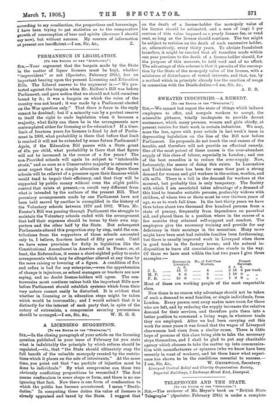PERMANENCE IN LEGISLATION.
[TO TEM EDITOR OP TRH "srEcTATom."] Snt,—Your argument that the bargain made by the State in the matter of liquor licenses must be kept, whether "improvident" or not (Spectator, February 29th), has an important bearing upon the present Licensing and Education Bills. The Liberal answer to the argument is :—" We pro- tested against the bargain when Mr. Balfour's Bill was before Parliament, and gave notice that we should not hold ourselves bound by it ; it was a bargain on which the voice of the country was not heard ; it was made by a Parliament elected on the War question only." That there is force in the reply cannot be doubted ; but if a minority can by a protest reserve to itself the light to undo legislation when it becomes a majority, what fixity can there be in the arrangements now contemplated either for licensing or for education ? If a time- limit of fourteen years for licenses is fixed by Act of Parlia- ment in 1908, what probability is there that before that limit is reached it will not be extended by some future Parliament? Again, if the Education Bill passes with a State grant of 47s. per child, what probability is there that that figure will not be increased in the course of a few years ? The non-Provided schools will again be subject to "intolerable strain," and as soon as a Conservative majority is returned we must expect that by a simple alteration of the figure those schools will be relieved of a pressure upon their finances which would tend to impair their efficiency, and that they will be supported by public money without even the slight public control that exists at present,—a result very different from what is intended by the authors of the present Bill. That pecuniary arrangements made by one Parliament have not been held sacred by another is exemplified in the history of the Voluntary schools between 1870 and 1902. When Mr. Forster's Bill was passing through Parliament the struggle to maintain the Voluntary schools ended with the arrangement that half their expenses should be borne by their own sup- porters and the other half by the State. But subsequent Parliaments altered this proportion step by step, until the con- tributions from the supporters of those schools amounted only to, I believe, fourteen instead of fifty per cent. Until we have some provision for fixity in legislation like the Constitutional Amendment in America and in France, or, at least, the Referendum, it seems a short-sighted policy to make arrangements which may be altogether altered at any time by the mere raising or lowering of a figure. A condition of flux and reflux is bad for any enterprise,—even the apprehension of Change is injurious,.as school managers or teachers are now saying, and no doubt license-holders will agree. The con- troversies must continue unless both the important Bills now before Parliament should establish systems which from their very nature cannot easily be disturbed. It is evident that whether in licensing or in education steps might be taken which would be irrevocable ; and I would submit that it is distinctly for the interest of each party that, in spite of the outcry of extremists, a compromise securing permanence
should be arranged.—I am, Sir, &c., W. H. G. S.














































 Previous page
Previous page